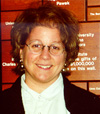SEI welcomes Givre, other talent to team
by Cindy AbolePublic Relations
Storm Eye Institute's Syndee Givre is one who enjoys a challenge. She’s especially pleased if her expertise can help patients understand the unexplainable when it comes to double-vision or sudden vision loss.
 Dr
Syndee Givre
Dr
Syndee Givre
Givre, M.D., Ph.D., assistant professor of ophthalmology, is one of the newest talents to join the Storm Eye Institute team. She sees patients who have experienced eye or brain problems leading to loss of vision or abnormal eye movements. Such problems can occur at any age, and can be caused by factors like strokes, tumors, infections or inflammation of the brain and optic nerve.
Givre is one of two neuro-ophthalmologists at the Storm Eye Institute applying her skills to help solve serious eye problems or diseases.
“After two years on the neuro-ophthalmology service at the University of Iowa, Dr. Givre was looking for a permanent academic home,” said Ed Wilson, M.D., professor and chairman of ophthalmology. “In my opinion, she was the best candidate in her field in the country. We are very fortunate to have her join the SEI team.”
“I’ve always liked science,” said Givre, a Queens, New York native. “From my early days in college, I thought I’d be working in bench research.” But while working in the lab, she missed the social contact with people. This eventually led her towards both clinical research and medicine. Givre applied to the Medical Scientist Training Program at Albert Einstein College of Medicine in New York City—one of the country’s premier M.D.-Ph.D. programs. Completing her dream would take a total of eight years.
“I enjoyed a great time in the lab,” said Givre, who completed her science doctorate studying neurophysiology. Her focus was studying electrophysiological responses of the visual pathways. Her ultimate goal was to become a neurologist. “It's exactly what I wanted to do,” she said.
 Dr.
Syndee Givre checks Millan Budev's peripheral vision using a Goldman Perimeter
device.
Dr.
Syndee Givre checks Millan Budev's peripheral vision using a Goldman Perimeter
device.
However, during medical school, Givre had the opportunity to participate in a neuro-ophthalmology rotation working with world-renown neuropathologist Ronald Burde, M.D., chairman of Opthalmology and Visual Sciences at Montefiore Medical Center at Albert Einstein College of Medicine. Working with Burde convinced her to pursue her interest in the visual system as an ophthalmologist, specifically a neuro-ophthalmologist.
After completing her internal medicine internship and a three-year ophthalmology residency at Mount Sinai Medical Center, Givre pursued a fellowship at the University of Iowa's Department of Ophthalmology and Visual Services, widely held as the country’s leading centers in cutting-edge research and neuro-ophthalmology patient care. She was able to gain key clinical experience specializing in disorders that affect vision, eye movements and the brain.
Her interests continue to lie focused on the effectiveness of electrophysiological testing of the optic nerve and visual pathways as a means for diagnosing problems. During the electrophysiological tests, specialists measure both the optic nerve and brain responses while a patient observes an object or stimulus. This is a more sensitive measure of vision than simply asking the patient whether or not she can see the stimulus. Electrophysiologic testing may be an important part of diagnostic testing for patients in the future.
“Neuro-ophthalmologists are always looking for sensitive ways to detect damage to visual pathways,” Givre said. “The key is to identify problems early on using specific tests. The earlier things can be caught, the quicker they can be treated. Our focus is all about early detection and prevention.”
Along with Givre, Wilson has recently hired specialty ophthalmologists to join Storm Eye Institute’s team. These include retina specialist Sarah Elsing, M.D., Duke University; cornea specialist David Vroman, M.D., Bascom Palmer Eye Institute at the University of Miami and retina specialist Armand Farr, M.D., Wilmer Eye Institute at Johns Hopkins University.
“One of the best things about ophthalmology at the Storm Eye Institute, is that every eye specialty —glaucoma, cornea, low vision, oculoplastics, pediatrics, retina, pathology and neuro-ophthalmology—is well-covered by physicians who've had fellowship training in these specialized areas,” Givre said.
“Hopefully, that's helpful to physicians in the community who don’t
have this type of sub-specialty training and want to help their patients.
It gives them a place to send their complicated patients.”